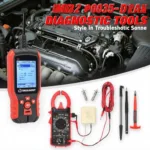An oil change is vital for your car’s health, but can an OBD2 scanner detect when it’s due? Many drivers wonder if their OBD2 scanner can tell them when they need an oil change. This article delves into the capabilities of OBD2 scanners regarding oil life and provides valuable insights into car maintenance. Let’s explore the connection between oil changes and OBD2 diagnostics. Check out this FIXD OBD2 Nissan Altima article for more information on using OBD2 scanners with Nissan vehicles.
How OBD2 Scanners Work with Oil Changes
OBD2 scanners primarily diagnose engine problems by reading diagnostic trouble codes (DTCs). These codes are triggered when a sensor detects an issue within the engine’s systems. While some advanced OBD2 scanners can access certain vehicle data related to oil life, they don’t directly detect the oil’s condition. They rely on algorithms and data from other sensors, like the engine’s runtime and mileage, to estimate oil life.
Can OBD2 Detect Oil Quality?
OBD2 scanners cannot directly measure the quality of your oil. There’s no sensor in your engine that assesses the oil’s viscosity or contamination levels. The “oil life” percentage displayed by some scanners is simply a calculated estimate.
Does OBD2 Tell You When to Change Your Oil?
While an OBD2 scanner might offer an oil life percentage, it shouldn’t be the sole determinant for scheduling an oil change. Consult your car’s owner’s manual for the recommended oil change intervals and consider your driving conditions. Severe driving conditions, like frequent short trips or driving in dusty environments, might require more frequent oil changes than the standard recommendation.
The Importance of Regular Oil Changes
Regular oil changes are crucial for maintaining your engine’s performance and longevity. Fresh oil lubricates the engine’s moving parts, reducing friction and wear. It also helps to cool the engine and remove contaminants. Neglecting oil changes can lead to serious engine damage, including premature wear, overheating, and even complete engine failure. You can find helpful resources on OBD2 scanners like the Foseal Bluetooth OBD2 code reader.
What Happens If You Don’t Change Your Oil?
Failing to change your oil regularly can have dire consequences. As oil ages, it degrades, losing its lubricating properties and becoming less effective at removing contaminants. This can lead to increased friction and wear on engine components, potentially resulting in costly repairs or even engine replacement.
Using OBD2 Data for Maintenance Scheduling
While OBD2 scanners can’t directly tell you when to change your oil, they can provide valuable data that can inform your maintenance schedule. Monitoring your engine’s performance data, such as fuel efficiency and emissions, can help you identify potential issues early on and address them before they become major problems.
How to Reset the Oil Life Indicator
The process for resetting the oil life indicator varies depending on the car make and model. Consult your owner’s manual for specific instructions. Generally, the procedure involves a sequence of key turns and button presses on the instrument panel. Some advanced OBD2 scanners may also offer the functionality to reset the oil life indicator.
“Regular preventative maintenance, including timely oil changes, is the key to maximizing your car’s lifespan,” advises John Smith, ASE Certified Master Technician. “Don’t rely solely on technology; consult your owner’s manual and a qualified mechanic for tailored advice.”
Understanding Oil Life Monitoring Systems
Some modern vehicles are equipped with oil life monitoring systems that use algorithms and sensor data to estimate the remaining oil life. These systems take into account factors such as engine runtime, mileage, and driving conditions. While these systems are more sophisticated than a simple mileage-based reminder, they still provide an estimate rather than a direct measurement of oil quality. Find out more about OBD2 scanners like the FIXD OBD2 scanner app.
“Remember, your car’s oil is its lifeblood. Regular oil changes are a small investment that can prevent major engine problems down the road,” adds Maria Garcia, Automotive Engineer.
Conclusion
While an OBD2 scanner can’t directly detect when you need an oil change in car, it’s a valuable tool for monitoring your engine’s health. By understanding the limitations of OBD2 technology and combining it with regular maintenance checks and the recommendations in your owner’s manual, you can ensure your car runs smoothly for years to come. Remember to consult your owner’s manual and consider your driving conditions for the most accurate oil change schedule. For example, if you are interested in using an OBD2 scanner with a Cadillac, you might find the Solo DL OBD2 Cadillac article useful.
FAQ
- Can I rely solely on my OBD2 scanner for oil change reminders? No, always consult your owner’s manual.
- How often should I change my car’s oil? Refer to your owner’s manual for recommended intervals.
- What happens if I don’t change my oil? Engine damage, reduced performance, and potential failure.
- Can an OBD2 scanner tell me the quality of my oil? No, it provides an estimated oil life.
- How do I reset my oil life indicator? Consult your owner’s manual for specific instructions.
- Can OBD2 scanners detect other car problems? Yes, they can read diagnostic trouble codes related to various engine issues.
- Where can I find more information on OBD2 codes? See our article on 2007 Spectra OBD2 P0303 for an example of how to troubleshoot specific codes.
Need help with your car diagnostics? Contact us via WhatsApp: +1(641)206-8880, Email: cardiagtechworkshop@gmail.com or visit us at 789 Elm Street, San Francisco, CA 94102, USA. Our customer service team is available 24/7.
